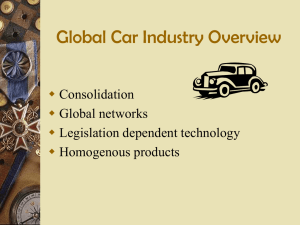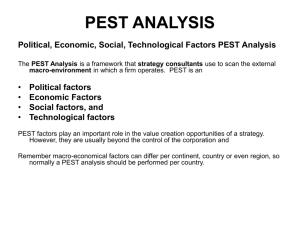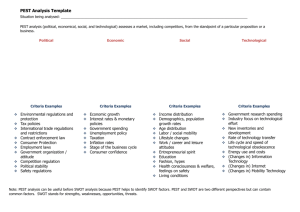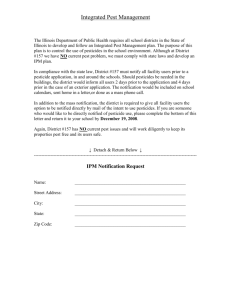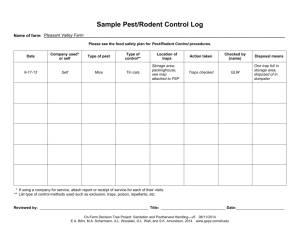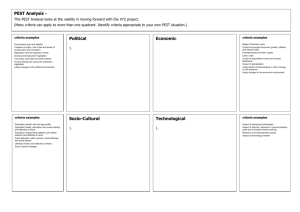Applied Business Development TS 6_2
advertisement
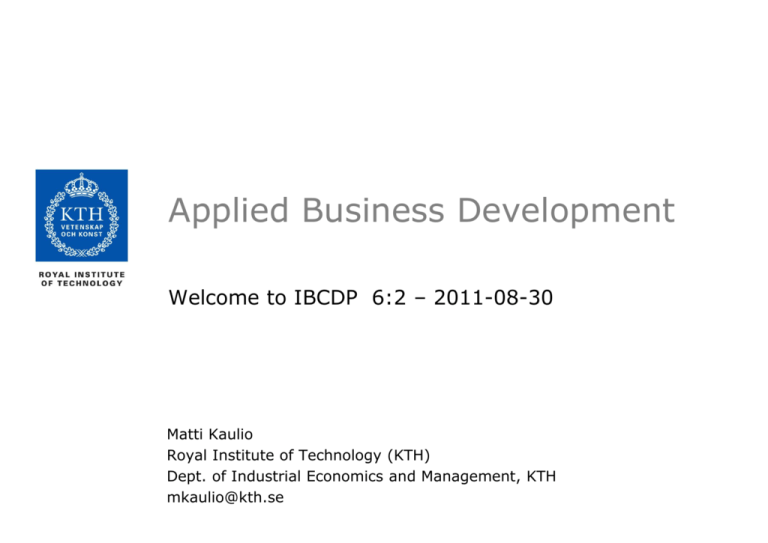
Applied Business Development Welcome to IBCDP 6:2 – 2011-08-30 Matti Kaulio Royal Institute of Technology (KTH) Dept. of Industrial Economics and Management, KTH mkaulio@kth.se Roadmap • Recapitulation • Best Assignment • Understanding Business Environment • Business Case Work F2F 2 • Strategic awarness • Understanding Business Environments • Adding Value (Service Design) • Service Production & Launch • “Making it Happen” & Examination Learning Goal • How could new business opportunities look like in your industry? • What competencies are needed for spotting and developing them? Last Meeting: Bussiness Models and Offerings Market and Technology Evolution: Past – Present – Future? Generative Network •New Industry Entrants •Converging Tech., Industries & Businesses “Open” Network •Deregulation •Competiton •IP-based Tech. Propritarian Network •Market monopoly •Switch-based Tech. The Business Model I C Customers Value Propositions O R Revenue model Business Concept Offering Costs BS Business System Costs Source: Based on SIAR Normann, 1977, & Dr. Tommy Bergkvist, Strategic Management Institute, modified Costs Problem-Segment-Offering (PSO) model The Problem/need a customer face An identified market - Segment ”Offering” and Revenue Model Revenue Models • Producer model • Broker model • Consultancy model • Performance-based model • The TelCom model/combination model (fixed cost + opening cost + variable cost; opening fee + downloaded data) • The TechTrade model: Licenciering + royalty • The ”Gilette” model • The ”Drug Dealer” model • The ”Gore-Tex model” • The ”Adobe” model • The ”Singer” model • The Construction Industry model • ”Free” models Last Homework Assigmnent June 2011 Assigmnent and deliverable Assignment: Make an divergent analysis of your case topic. That mean that you should develop a few (3-5) different possible applications, analyze and characterized them, and when you meet in the next module be prepared to chose one of these applications to continue with. Deliverables Hand in: A report including a comparison of generated possible applications. The report is written in Power Point and covers the ssigmnemnt, description of your research findings, description of 3-5 PSO offerings and a summarizing table The report should be written in and handed in no later than on the 24st of June. Process 1. 2. 3. 4. 5. 6. Do research: What similar applications exists? What are their offerings? Etc. Use internet and other sources Redflect upon the findings Generate alternatives: Develop 3-5 new PSO descriptions of new applications Summarize your findings in a power Point Presentation where your potential applications are presented in text and in a table - do not select which application to continue work with! This is a task för the next F2F module Before leaving today you should have showed your preliminary applications for the coaches Coaches will be walking around bewteen the groups. They should be seen as resources for your work. Best Assignment. . . Best Assignment • Group 4 Understanding Business Environments ” Industry Attractivness” The Landscape: Which Road to Go? Content • PEST(EL) • Porter’s 5-Forces • Generic strategies • Market estimates PEST, PEST(EL) • Political - Regulations, tax policy, trade restrictions, and political stability - Promotion of: health, education, and infrastructure of a nation. • Economic - Economic growth, interest rates, exchange rates and the inflation rate, • Social factors - cultural aspects, population growth rate, age distribution, career attitudes and emphasis on safety and demographic changes such as aging population. • Technological factors include technological aspects such as - R&D activity, automation, technology incentives and the rate of technological change. • Environmental factors - environmental law, ecological and environmental aspects such as weather, climate, and climate change. This aspect is linked to Political and leagal factors • Legal factors - labour law, discrimination law, consumer law, antitrust law, employment law, and health and safety law Industry Analysis: 5-forces Source: DeWitt & Meyer, 2004. Generic Competitive Strategies (Porter) • Cost leadership • Differentiation • Focus Nonconsumers or nonconsuming contexts Performance Different performance measure 1. The Disruptive Innovation Theory • Discount retailing • Stell minimills Time • Telephone • Personal computers • Photocopiers Company improvement trajectory Customer demand trajectory Time 5-Forces & Macro Environment Source: DeWitt & Meyer, 2004. Modified Some Generic Strategies Generic Competitive Strategies (Porter) • Cost leadership • Differentiation • Focus Aggressiveness (Miles & Snow) • Prospector • Analyzer • Defender • (Reactor) Alternative Generic Strategies • Niche players • Pioneers • Local producers • Dominant firms • Mee-too firms • Worldwide replicators • Professionals • Rationalizers • Conglomerates Market estimates • How many petrol stations are there in the USA? Approaches • Top-down • Bottom up • Iterative process • 126 889! Understanding Business Environments ”Uniqueness” Content • Value Chain vs Value Star • 4-action framework Porter’s Value Chain C Customers Value Propositions O R Revenue model Business Concept Offering Costs BS Business System Costs Costs Question? • What is the strategy of Skistar? Value star Uniqueness? Value Chain vs Value Star The Four-Action Framework (Blue Ocean) Reduce Which factors should be reduced well below the industry’s standards Eliminate Which of the factors that the industry takes for granted should be eliminated? A new value curve Create Which factors should be created that the industry has never offered? Raise Which factors should be rasied well above the industry’s standards? Summary Your challenge this time . . . • ”Paint the landscape” • ”Develop unique offerings” Assessment matrix, example Application #1 Relative (Four-action framework) Customer Value Uniqeness (Four-action framework) Industry attractivness/ Intensity of Competition (Pest, 5-Forces) Protection Revenue Potential Growth Potential Diversification potential ... Application #2 Application #3 Homework assignment 2 To be handed in on the 9th of September Homework, to bee reported on the 9th of September 1. Chose one of your applications (or a combination of) 2. Conduct a deeper analysis of your application based on the 5-Forces & PEST. Try the 4 action framework 3. If you are not satisfied – chose another application and iterate 1-2 4. The outcome should be one (1) selected application with a ”thick” background description! Process 1. 2. Chose one of your applications (or a combinations of), use the assessment matrix Create a PEST(EL) analysis of this application 1. 3. Create the 5-forces map. 1. 2. 4. 5. Are some aspects more important than the others? TIPS: The delimitation of the industry can be tricky, and this issue is strongly linked to the final result When conduction your 5-force analysis, use easy market estimates Try the 4-action framework to further develop your product Summarize your findings in a Power Point Presentation 1. 2. Before leaving today you should have showed your preliminary applications for the coaches Coaches will be walking around bewteen the groups. They should be seen as resources for your work. PEST, PEST(EL) • Political - tax policy, labour law, environmental law, trade restrictions, and political stability - Promotion of: health, education, and infrastructure of a nation. • Economic - economic growth, interest rates, exchange rates and the inflation rate. • Social factors - cultural aspects, population growth rate, age distribution, career attitudes and emphasis on safety and demographic changes such as aging population. • Technological factors include technological aspects such as - R&D activity, automation, technology incentives and the rate of technological change. • Environmental factors - ecological and environmental aspects such as weather, climate, and climate change. This aspect is linked to Political and leagal factors • Legal factors - discrimination law, consumer law, antitrust law, employment law, and health and safety law Industry Analysis: 5-forces Source: DeWitt & Meyer, 2004. The Four-Action Framework (Blue Ocean) Reduce Which factors should be reduced well below the industry’s standards Eliminate Which of the factors that the industry takes for granted should be eliminated? A new value curve Create Which factors should be created that the industry has never offered? Raise Which factors should be rasied well above the industry’s standards? Assessment matrix, example Application #1 Relative (Four-action framework) Customer Value Uniqeness (Four-action framework) Industry attractivness/ Intensity of Competition (Pest, 5-Forces) Protection Revenue Potential Growth Potential Diversification potential ... Application #2 Application #3
